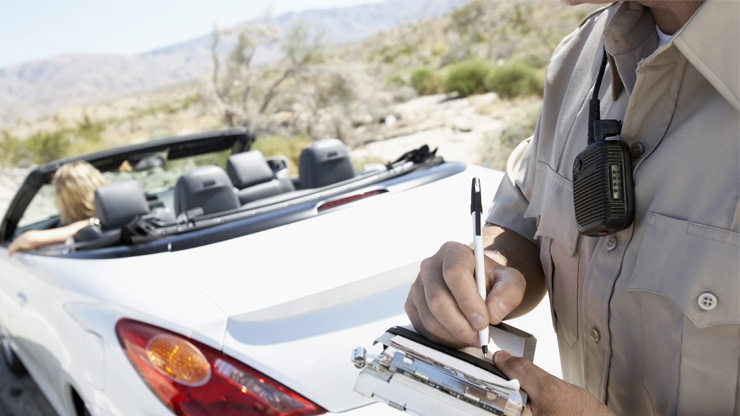
Receiving a traffic ticket is certainly not going to be the highlight of anyone’s day. Whether its for driving a little too fast, rolling through a stop sign, or changing lanes without using your signal, traffic tickets can hurt your wallet with fines and costs and possibly increasing your insurance rates. Get too many traffic tickets and it can even lead to a suspension in driving privileges.
So what should you do when you receive a traffic ticket? The easiest thing is to simply mail it in with the $164 fine and be done with it, but that course of action can have consequences that most people are not aware of. This article seeks to address some common questions people have when they receive a traffic ticket.
Not all tickets require attendance at court. If you check the bottom of your ticket there will be two boxes, if the one for “No court appearance required” is checked, then you do not have to go to court and you will have the option of mailing in your ticket. However, if you would like to challenge the ticket, or try to get court supervision to keep a conviction off your record, mailing in your ticket in may not be an option.
If you do not agree with the ticket you received, you may set your case for trial. In Illinois, all traffic violations that are prosecuted under state statute may be set for either a jury trial or a bench trial. If you are charged by a municipality, then your case may only be set for a bench trial, unless the ticket has the possibility of jail time, then you would have the option of setting your case for jury trial. At either type of trial, it is the state’s burden to prove you guilty beyond a reasonable doubt and you do not have to prove anything. At a jury trial, it is 12 members of the community that determine the question of guilt or innocence, whereas at a bench trial, a judge makes that determination. In order to set your case for trial, you can either check the appropriate box on your ticket and send it in, or you can appear on your first court date, which in most jurisdictions will be the arraignment date, and ask the court to set your case for a trial.
Every county and municipality in Illinois operates a little differently. In most cases, for tickets that do not require a court appearance, you will have to specifically ask that the case be brought into court with the clerk of the circuit court in the county you were ticketed. Most of the time that court appearance will be set for arraignment and not for trial. Police officers and other witnesses are not usually expected to attend court hearing unless it is specifically scheduled for trial. However, if the case is set for trial and the police officer does not show up, there is a strong likelihood that the ticket will be dismissed.
If you decide to go to court and end up being found guilty or plead to the charge, then the court will assess court costs in addition to the fine listed on the ticket. Additionally, the prosecutor may ask for an increased fine, all the way up to $1,000 for petty traffic offenses. However, if you take your case to trial and are found not guilty, then you would not owe any fines or court costs.
If you do not believe your case is a good candidate for trial but want to keep the conviction off your record, you may be eligible for court supervision. Court supervision is a special disposition, that is not a conviction on your record. If you receive court supervision, you would plead guilty to the charge and the case would be continued for up to 2 years. As long as you abide by all the terms of your court supervision order, the ticket will be dismissed at the end of the supervision period without a conviction ever entering on your record. The usual terms for court supervision include not getting any more tickets during the supervision period and paying your fines and costs. In addition to that, the state may also require you to attend a traffic safety school.
You don’t always have to go to court to receive court supervision but you must meet the following conditions:
If you meet these conditions then you may plead guilty and request court supervision by checking the appropriate box on your ticket and mailing it in. If you receive court supervision after mailing your ticket in, you will be required to attend a 4 hour traffic safety course at an additional expense of $50. However, if you do not meet the requirements above, your ticket will go down as a conviction.
Even if you do not meet all the requirements above, it is still possible to get court supervision by going to court. The requirements for court supervision in court are less than if you mail your ticket in, however, you will be required to pay court costs in addition to your fine. Court supervision is available on the majority of traffic offenses up to twice in a 12 month period, going by date of offense. Even if you have multiple convicitons on your record in the past year, you could still be eligible for court supervision, assuming you do not have more than one court supervision within the past year. Additionally, if you get court supervision through the courts, you may not have to attend the 4 hour traffic safety school that is required when you get court supervision through the mail.
Too many traffic tickets may suspend your driver’s license. If you are over 21 and receive 3 traffic tickets within one year, then your license will be suspended. The length of the suspension will be determined by the severity of the 3 tickets that led to your suspension. If you are under 21, then 2 tickets within 2 years will lead to a suspension. Additionally, a conviction for certain offenses on their own could lead to a suspension, such as driving an uninsured motor vehicle or passing a school bus while children are loading. If you are in danger of losing your license, getting court supervision is a way of avoiding a conviction and could keep your driving privileges in-tact.
